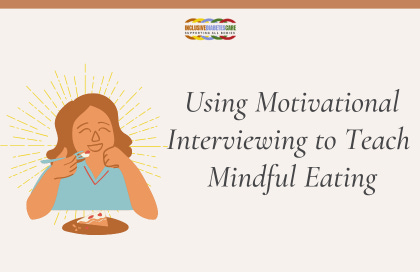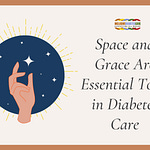Diabetes care is becoming more and more divisive. Here are a few typical "shoulds" on social media that fail to come alongside our clients.
Instead of reinforcing the binary view that there are good and bad foods, you want to use MI and come alongside by asking: What foods impact your blood sugars the most?
Instead of reinforcing diabetes shame by saying there are foods you should eat if you have diabetes. You want to use MI and come alongside by reflecting the client's deeper intention, which might be: You want to learn if there are foods that can stabilize blood glucose.
Instead of agreeing that there are good and bad blood sugars, you want to come alongside and reflect on your client's unspoken question. You want to know what the target blood sugars would be for you.
Instead of reinforcing a medical hierarchy by agreeing that there is a right way to manage diabetes, you want to use MI and help the client pause and consider, "What are the guidelines for diabetes?"
Learning how to use Motivational Interviewing, MI, in diabetes care is effective because Motivational Interviewing is an organized, nonjudgmental counseling approach with proven effectiveness and efficacy.
However, MI alone doesn't address internalized weight bias. Research shows that for clients to recover from internalized weight bias, they need to develop self-compassion and self-acceptance, actively engage in efforts to resist damaged social identities, and demand respect, dignity, and fair treatment from their healthcare providers.
Using MI to teach Mindful Eating is fantastic because these two tools support and cultivate a growth mindset. Inclusive Diabetes Care is so excited to present How to use Motivational Interviewing to teach Mindful Eating to your clients with elevated blood sugar.
This program provides a deeper dive into MI and Mindful Eating for your clients with diabetes.
Instructor: Megrette Fletcher, M.Ed., RDN, CDCES, has no conflicts to report.
1-10 minutes: The Spirit of MI: How to use the PACE acronym
11-15 minutes: Practicing coming alongside clients: writing activity
21-30 minutes: Exploring the purpose of Mindful Eating.
31-40 minutes: How does holding a nonjudgmental stance reduce internalized weight bias?
41-50 minutes: Resources to help clients learn more about mindful eating
51-60 minutes: Documenting your visit, reviewing EMR Swipe file and Q&A
Performance Indicators
8.2.1 Engages in educational activities to maintain knowledge and to obtain new knowledge of diseases and clinical conditions.
9.3.5 Uses a variety of strategies to deliver education.
9.6.8 Develop counseling or coaching goals in collaboration with clients.
All Books by Megrette Fletcher use Motivational Interviewing to teach Mindful Eating and Weight-Inclusive Diabetes Care.















Share this post